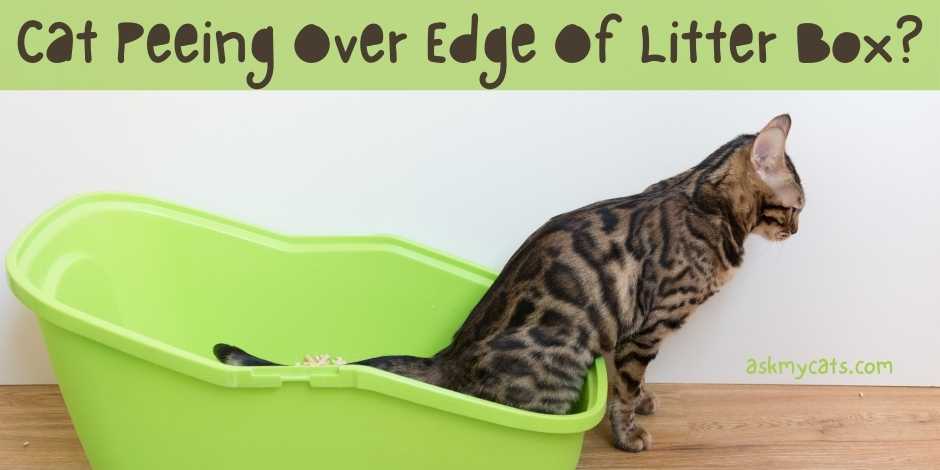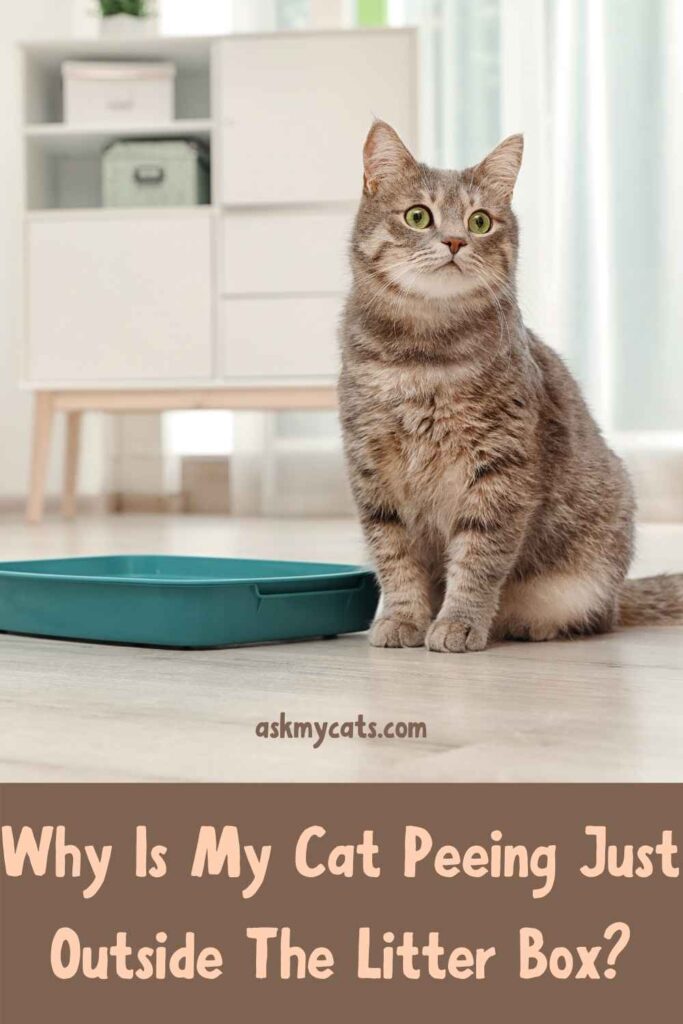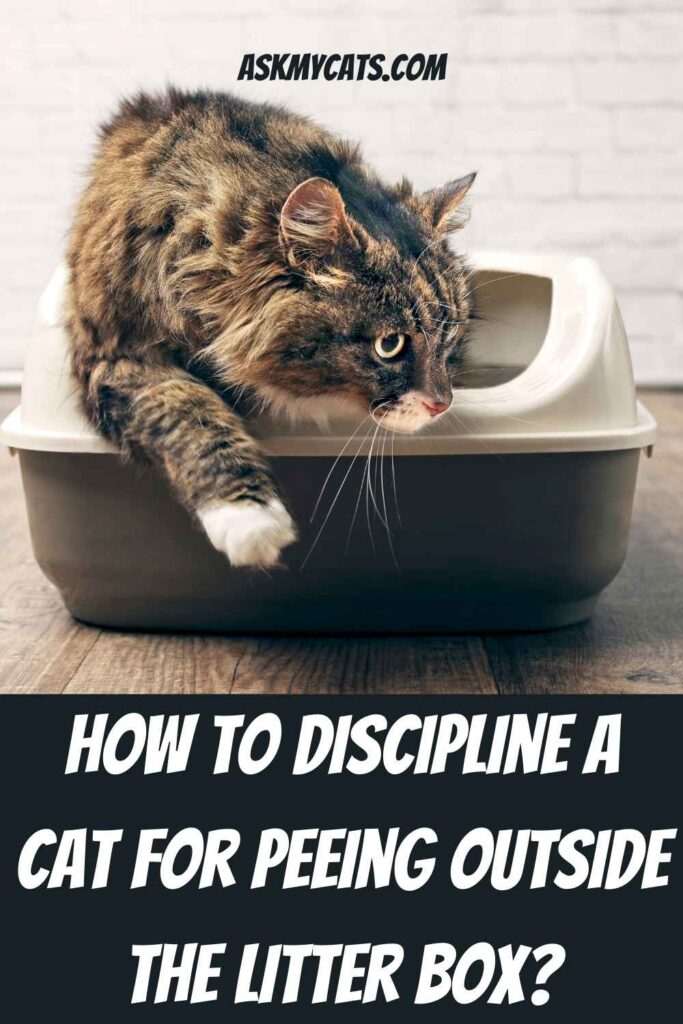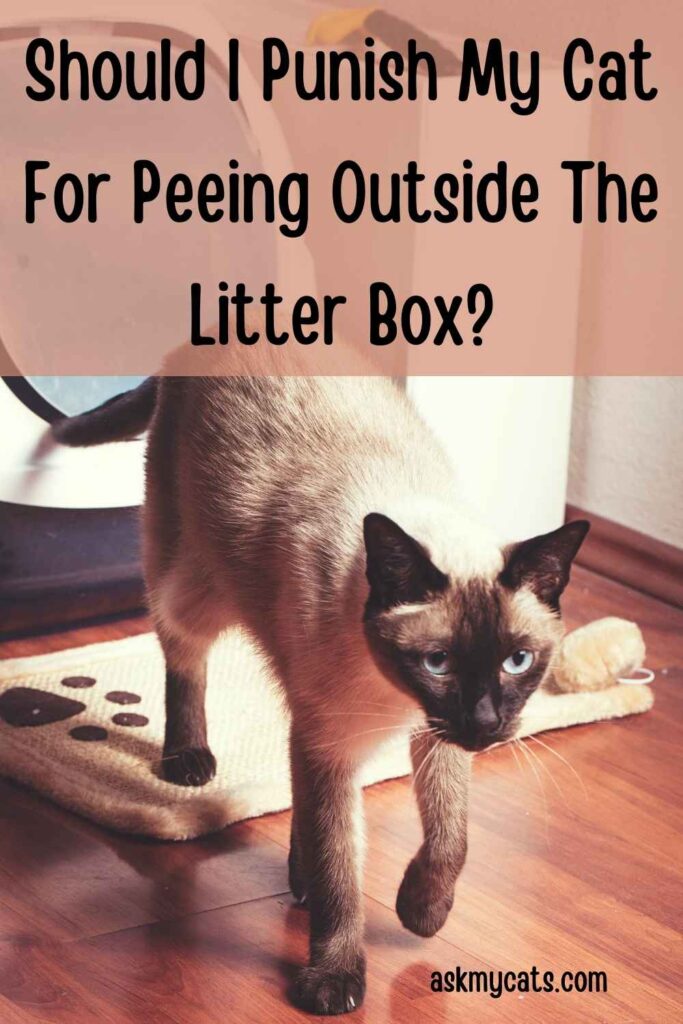Cats can be picky about their bathroom habits, and a dirty litter box may be deemed unacceptably filthy.
Cats have an extremely sensitive sense of smell, so what you think is clean isn’t necessarily hygienic in your cat’s eyes.
One of the numerous things might be causing your cat to pee over the edge of the litter box: The litter box does not fit properly; health difficulties make it difficult to urinate on target; the box is unclean, leading it to move at an odd angle; and so on.
If you don’t scoop out lumps every day and change the litter on a regular basis, your cat may go on a litter box strike, urinating on the floor or over the edge of the box.


Give Your Cat the Perfect Day
Get the Free Ebook!
Why Is My Cat Peeing Just Outside The Litter Box?
Cats are moody creatures, and when they are up for something, nobody can stop them. If they are peeing outside the litter box it means that they do simply not like the litter box.
Here are some typical reasons why your cat would enter their litter box but not use it:

1. Medically Not Fit
A urinary infection is a frequent medical problem. This may cause your cat to have an unexpected need to go to the toilet. They may get to the box, but they will not have enough time to get into the proper position.
Your cat’s bad behavior might also be caused by diabetes, renal failure, or a dangerous urinary blockage.
Always assume that something is wrong with your cat and that any change in their behavior is a sign that something is wrong.
Maybe your cat can’t squat as well as they used to, or they’re in discomfort when they attempt. They may be doing it because they are unable to place themselves in the litter box in a timely manner.
Arthritis is a common medical condition that prevents your cat from stooping all the way down. They may require medicine to make the discomfort more bearable and to allow them to move as they did previously.
2. Under Stress
Another element that is less obvious but might be related is if they have begun to feel the urge to defend their area. This is a common reaction to introducing a new animal into the house, particularly another cat.
Additional stressors in your cat’s life might also be an influence on their new bathroom habits. If you’ve just made adjustments or they’ve just moved in, they may be more stressed than normal and less concerned about their potty habits.
Cats are extremely sensitive to even little changes in their surroundings. Whatever the reason for your cat’s agitation, make sure it has a peaceful spot to retreat to. This haven of refuge should not be accessible to the new animal or person.
Your cat may be attempting to communicate with you that it is stressed at home.
It’s possible that it’s dissatisfied with another animal in the house and is marking its territory to communicate with them.
If the other animal is out and about, your cat may decide that accessing the litter box is too dangerous. If there is a new person in the house, your cat may “act out.”
3. Disgusted With The Box
Other problems with the litterbox might exist. It’s possible that they won’t be able to move about and correctly position themselves in it since it’s too little. It’s possible that the box’s walls aren’t tall enough for the way they generally pee.
Some cats are sensitive to the textures they encounter underneath their fur. They’ll want to get out of there as soon as possible if they don’t enjoy the sensation of the trash under their feet. That may mean skipping the squat altogether.
The litter box might also be to blame for the stains on the carpet. Your cat’s litter box must be kept in immaculate shape for them to continue to use it. They will consider the litter box unsuitable if it becomes too unclean.
They may be unable to locate a satisfyingly clean location in which to do their business, so they conclude that thinking outside the box makes more sense.
Have you made any recent changes to the litter box? If you’ve switched to a different type of litter, this might be your cat’s way of letting you know they don’t like it.
4. Spraying- The Not Known Evil
Finally, if you want to correct your cat’s behavior, it’s essential to figure out exactly what sort of conduct you’re dealing with.
A cat that sprays instead of merely missing the sides or failing to squat is in another scenario.
Check to check whether your cat has peed elsewhere in the house other than the litter box. Vertical peeing is a common indicator of spraying, and your cat may be attempting to communicate that they are experiencing different emotions. Their territorial dominance may be aided by this behavior.
Why Does My Cat Pee Outside the Litter Box But Poop Inside The Box?
This frequently happens if the cat isn’t fixed or if their environment has changed significantly (new cat, dog, move, etc.) Most cats have a strong, innate need to “cover-up” within a litter box. This might also be the case if your female cat hasn’t been spayed.
When cats urinate or defecate outside the litter box, it’s usually because they’re bothered by something. It might also be a symptom of a health condition you’re not aware of.
Because cats are so skilled at disguising health problems, seeing changes in their behavior might be your sole clue that something is wrong.
It is recommended that you take the cats to the doctor and discuss the various causes of the behavior with your veterinarian. Illness, worry, or external changes in their surroundings can all induce inappropriate elimination.
Urinating outside the box is a frequent indicator of a urinary tract infection, so make sure the cat gets examined.
Check out more details on why cats will pee but not poop in a litter box
How To Discipline A Cat For Peeing Outside The Litter Box?
You can train your cat to strictly pee inside the litterbox or you can try to clean and sanitize the litterbox so that your cat becomes attracted to it.

To begin, make sure your cat’s litter box is as clean and appealing as possible. Choose the largest litter boxes you can and keep them exposed as much as possible. Your cat, especially if it’s a big or fluffy cat, may feel crowded within a covered box.
Make sure you have a box on every floor of your house.
Your elderly cat should be able to go into the litter box with ease. Consider purchasing a shallow kitty box or installing a ramp at the box’s entrance.
Place litter boxes in a residence that is both calm and accessible. Make sure they aren’t near your cat’s eating or drinking area.
Choose a cat litter that your cat enjoys. Consider using a decorative screen to divide the cat litter box location from other places for your cat’s privacy and your personal design.
Many veterinarians advise keeping two litter boxes: one for each cat and one spare. Even in a one-cat household, this means having two litter boxes. This is due to the fact that some cats prefer to use one box for pee and the other for feces.
The other purpose is to keep cats from fighting over litter box territory.
Make sure your cat is comfortable in your household. To make your cat’s surroundings ideal, provide lots of vertical space and feline enrichment. Remember to engage your cat in playtime and give toys.
If environmental adjustments are ineffective, your veterinarian may suggest a supplement or prescription medicine to help your cat cope with stress and anxiety.
To totally eliminate the stink, carefully clean any improper locations where a cat has urinated with a special cleaner, such as an enzyme cleaner. Otherwise, your cat could keep peeing there.
In general, being a responsible, attentive cat owner is the key to preventing or eliminating improper urination in cats. Maintain your cat’s health by taking him to the vet on a regular basis and as soon as any problems arise.
Reduce stress in your cat’s habitat by attempting to maintain a cat-friendly, low-stress environment.
Because cats’ natural nature is to hide their excrement, they are often easy to teach. If your cat is urinating outside the litter box, there is likely a medical or management issue that may be resolved.
If your cat is healthy, spay or neuter it right away.
If your cat is anxious, speak with your veterinarian. Remove any dangerous items from your cat’s environment if they are disturbing him.
If you’ve recently relocated the litter box, return it to its original spot.
Nobody wants to use a filthy toilet, so change the cat litter on a regular basis.
Use a litter box that is appropriate for your cat’s size. Your cat will not utilize a litter box that is too tiny.
Remove anything that irritates you within the litter box, like nails or anything else pointed.
Each kitten should have its own litter box. Catfights and urinating outside to indicate their territory are common as a single litter box.
If your cat has a medical problem, such as a urinary tract infection or arthritis, see your veterinarian right once.
Should I Punish My Cat For Peeing Outside The Litter Box?
Never penalize your cat for peeing on the carpet; it will just confuse and annoy your cat while accomplishing nothing. There is no effective punishment for cats that urinate outside of the litter box.

A clean litter box, as well as a clean bill of health, is the finest remedy. Instead, take your cat to the doctor to rule out any medical issues before attempting to figure out why they aren’t using their litter box.
It’s not a good idea to punish a cat for peeing on the carpet. Cats do not urinate outside of their litter boxes for no reason, and punishing them for it is both ineffective and detrimental to the cat.
The cat’s owner must first figure out why the cat is peeing on the carpet, rug, or furniture in the first place, and then take steps to correct the problem.
When you discover the spots where the cat has been urinating, thoroughly clean them and apply an enzyme spray to eliminate the odor. These enzymes are available in pet shops and supermarkets.
If the urine is on the carpets, the enzyme treatment may need to be repeated numerous times to entirely remove the stench.
Check out more details about How To Discipline A Cat For Peeing Outside The Litter Box?
Frequently Asked Questions
Why is my cat peeing over the side of the litter box?
It’s possible that you’re overfilling the litter box. It’s possible that your cat is peeing over the edge of her litter box because it’s overflowing. Cat manufacturers recommend using two to three inches of litter, but if your cat is a deep scratcher, you may use up to four inches. Start with two inches and see what depth is best for your cat.
Is my cat a vertical pee-er?
Some cats, both male, and female, may pee within the litter box while standing up, or while kneeling and then gradually stand up as they finish. Female cats, too, do this — we have our own resident pee-er in the form of Ruby. On the other side, spraying is a territorial activity.
Why does my cat stand on edge of a litter box to poop?
Your cat may be performing a balancing act by entering the box but standing on the edge rather than in the litter, causing pee or feces to spill over the side. If your cat is standing on the edge of a huge box, it is likely that the cat does not like the litter.
Final Words
There’s nothing wrong with the box or the placement for certain cats. These cats may have recently had an unpleasant event, such as diarrhea or constipation, or a frightening encounter, such as a loud noise shattering their tranquil pooping episode, which they have now associated with the box.
Confine him to a single room with a number of wonderful kitty toilets. You may even train him to use the box and then reward him when you catch him doing so.
Allow him to wonder more rooms after 30 days of pottying just in the box, but only while monitored at first.
Leave your questions in the comments section below!
